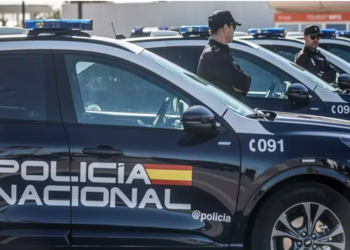The alleged involvement of a high-ranking Spanish police officer in cocaine smuggling threatens to undermine a drug trafficking trial and underscores how corruption infiltrates all levels of the country’s security forces.
The agent, Juan Carlos Carrión López, was slated to be a key witness in an ongoing trial of 28 people accused of trafficking 3.8 tons of cocaine to Spain. The drugs were seized in 2020 from a ship docked in Vigo, on the country’s northwest coast. Carrión led the police operation that seized the drugs.
But Carrión’s credibility on the stand and, by extension, the strength of the prosecution, has been called into question after Spanish authorities arrested him in March on suspicion of facilitating cocaine trafficking from Colombia to Spain. At the time of his arrest, Carrión had been serving as police liaison at the Spanish Embassy in Colombia for almost a year.
He is yet to appear in court due to purported health problems.
SEE ALSO: Flood of Cocaine Spreads Beyond Europe’s Cities, Wastewater Shows
“[Carrión] is accused of more crimes than the defendants in this case,” noted a defense lawyer representing the 28 accused of trafficking, according to reporting by El País.
Carrión is the purported leader of a criminal network comprising members of the Spanish police that moved cocaine shipments from Colombia to Spain. The group used a middleman to collaborate with drug trafficking clans in Murcia, southeastern Spain, according to recordings obtained by Spanish police and accessed by the newspaper El Confidencial.
After receiving payment for drug shipments and allowing the loads to be transported, Carrión and his accomplices allegedly organized ad hoc police operations to intercept the drugs during transit before they were delivered to buyers.
“If you follow my orders, no one will be in trouble. But if we each go our own way, we’ll be in a world of problems. You might even go to prison,” Carrión is heard saying to a collaborator in the recordings. The exchange occurred after a 150-kilogram cocaine shipment was stalled when a criminal group failed to pay Carrión in advance, according to El Confidencial.
In February, authorities arrested the head of the Spanish police’s drugs and crime unit in Murcia, who is believed to have protected middlemen negotiating with drug trafficking groups as part of the conspiracy.
Both police commanders had been given awards for their contribution to the fight against drug trafficking during their respective careers.
Despite the charges and other prominent cases of police corruption in Spain, authorities continue to deny that there is a widespread problem.
“This is a one-off case that can happen once in five years, or may not arise at all,” Ángel Bodoque Agredano, a Spanish drug prosecutor, told InSight Crime.
InSight Crime Analysis
Corruption is a key part of the cocaine supply chain to Europe, and the case of Juan Carlos Carrión presents an extreme example of the problem.
In Europe, 71% of the most threatening criminal networks use some form of corruption and 28% use it proactively and systematically, according to a recent report by the European Union Agency for Law Enforcement Cooperation (Europol).
What’s more, corruption from drug trafficking penetrates both private and public institutions, and police corruption is one of the most advantageous forms of corruption for criminal groups.
On April 12, a Spanish court sentenced a member of Spain’s municipal police and two national police officers to more than seven years in prison for guarding a shipment of 367 kilograms of Colombian cocaine in 2022. The shipment was intercepted thanks to international cooperation between Spanish and Colombian prosecutors.
SEE ALSO: Spanish Mega Lab Raises Questions About Cocaine Production in Europe
Back in 2022, Spanish authorities arrested five municipal police officers at the port of Algeciras, in addition to a policeman stationed in Ceuta, a customs official, and a former police official for their alleged participation in a drug ring that smuggled 6.2 tons of cocaine through southern Spain in various shipments.
This type of corruption can erode the credibility of institutions and damage their relations with international partners in the fight against drug trafficking. For this reason, detecting, investigating, and prosecuting this form of corruption is fundamental to dismantling transnational drug trafficking operations.
“Matters like [the case of Carrión] can only help us increase international cooperation and try to achieve the best levels of trust in Latin America,” prosecutor Bodoque Agredano told InSight Crime.
Despite these efforts, the booming cocaine trade continues to lure public and private sector workers alike into corruption.
“Criminal organizations are becoming more and more powerful, and the profit and criminal money that is moving is enormous. We all know that. Anybody can be tempted to join this dynamic,” said Bodoque Agredano.
Featured image: Police agents conduct an anti-narcotics operation in Spain. Credit: Rober Solsona / Europa Press

